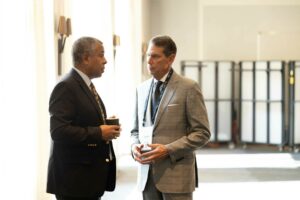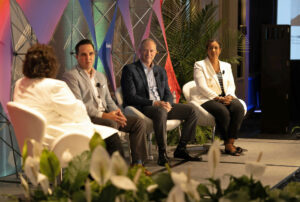- Featured
- IQ Insigniam Quarterly® Magazine
- Leadership for the Next Digital Age
- Transformational Leadership
Defining Leadership in a Digitally Enabled World
Gut check: Are you prepared for a future where technology doesn’t just create operational efficiencies in the working world as we understand it today, but rather, fundamentally redefines what it means to be human in the workplace?

On June 3rd and 4th, senior executives from around the globe gathered in Philadelphia for the 2024 Insigniam Executive Summit to contemplate this very question, as well as to explore the interplay between humanity and the rapid advancements in digital technology, data, and AI. The summit aimed to foster conversations around how to leverage the art of being human in the new work world that is quickly emerging and what will be required of leaders in this environment, such as inventing new ways of working.
“The impetus for our 2024 Executive Summit stemmed from a profound need to address the rapidly evolving relationship between humanity and technology,” said Shideh Sedgh Bina, Insigniam co-founder and Elixirr partner. “In an era where AI and digital advancements are reshaping every facet of our work and lives, we wanted to create a dialogue with forward-thinking executives to come together, exchange ideas, and explore how we can harness these technologies to elevate the human experience within our organizations.”
Throughout the executive summit, participants were encouraged to re-imagine leadership strategies and explore how to integrate AI and emerging technologies into their organizations not just as tools, but as catalysts for redefining roles and creating new opportunities for value creation. The summit wasn’t about providing easy answers but rather fostering a space for collective ideation and innovation.
“At Insigniam, we believe that the true potential of AI lies in its ability to amplify human ingenuity and redefine what’s possible within an enterprise,” said Nathan Owen Rosenberg, Insigniam co-founder and Elixirr partner. “By creating an environment where leaders can collaboratively explore these possibilities with their peers, they are setting the stage for a future where technology and humanity coexist to drive unprecedented value.”

The main event on June 4th kicked off with a keynote from Adam Hofmann of Elixirr, Insigniam’s parent company, on ‘Generating a Uniquely Human Future’ with AI. Mr. Hofmann’s thesis is that language has been the key to advancing humanity forward.
He framed recent advances in generative AI as the next frontier in the evolution of human language, since generative AI gives, “humans the ability to leverage technology to create with language.” This keynote highlighted the transformative potential of AI and set the stage for a day of dynamic discussions and thought-provoking sessions.
An executive panel featuring Matthew Hines, Head of Business Operations at Frontier Communications; Rita Khan, Chief Consumer Officer at Optum Health; and Dr. Bradley Leibovich, Medical Director of Mayo Clinic’s Center for Digital Health discussed their perspectives on the complexities of being human in an AI-infused workplace.
Mr. Hines shared insight regarding Frontier’s journey through significant transformation. Over the past decade, the company faced numerous challenges, including bankruptcy and a complete turnover of its C-Suite. The organization, amalgamated from various entities, struggled with disparate data systems and legacy knowledge. Frontier’s introduction of AI technology resulted in a 93% increase in productivity within a short period, highlighting the potential of AI to enhance business operations.
Ms. Khan shared her perspective on transformation stemming from her tenure at Mayo Clinic and Best Buy. She emphasized the need for a thoughtful approach to change, considering the unique culture and mission of each organization. Ms. Khan also highlighted the importance of building an infrastructure for digital transformation in healthcare to ensure effective, efficient, and affordable care that centers on patient needs.
Additionally, Dr. Bradley Leibovich, Medical Director for the Center for Digital Health at Mayo Clinic, spoke about the contrasting experience of integrating digital tools in healthcare. While the Mayo Clinic has a long history of medical innovation, the transition to digital tools initially eroded productivity and quality of care. The Center for Digital Health aims to leverage new technologies to connect with patients more meaningfully and improve care delivery. Dr. Leibovich emphasized the importance of maintaining human elements like compassion and empathy, which AI cannot replicate, to provide unparalleled patient experiences.

Building on an assertion by Elon Musk that in the future all jobs will be done by Robots and AI, each panelist was asked if their job would be gone. Mr. Hines noted that while AI could eventually handle almost all aspects of sales and operations, leadership roles requiring an understanding of business nuances and customer relationships would remain essential.
Mr. Leibovich argued that certain aspects of his job as a cancer surgeon, such as providing compassionate care, could not be replaced by AI. He saw AI as a tool to augment physicians’ ability to spend more time with patients, enhancing the human element of care.
The conversation also touched on the role of human connection in organizations. The panelists acknowledged the challenges of maintaining organizational culture amid technological advancements but expressed optimism about the potential of AI to enhance human capabilities and improve work environments. They emphasized the need for leaders to actively shape the future by integrating AI thoughtfully, ensuring that technology serves to elevate the human spirit and foster more meaningful connections within organizations.
Breakout sessions in the afternoon allowed participants to dive deeper into specific themes. In one session, executives discussed the conditions necessary for success with AI, emphasizing a growth mindset, curiosity, and the willingness to fail. The mantra of ‘ReThink, ReSkill, ReTrain’ underscored the need for continuous learning and adaptation. Participants also explored the potential for AI to automate mundane tasks, freeing up employees to focus on more engaging and meaningful work, which could lead to higher job satisfaction, greater creativity, and more innovative thinking.
“If we are to succeed in an era defined by rapid technological advancement, then an openness to learning and growth mindset will be key, as will transparent, authentic, inspirational leadership,” Nancy Imbalzano, Senior Director, Global Strategic Insights, Surgical and Vision Care, Alcon.

As the executive summit concluded, Bob Skinstad, Elixirr partner and former South American rugby captain who led South Africa’s national team, the Springboks, to win the 2007 Rugby World Cup gave closing remarks via his speech, “The Crazy Brave,” which speaks to human beings rising to challenging moments—mirroring the theme of the event and further creating a sense of optimistic anticipation for the road that lies ahead.
“I am most excited about the new spaces that will be created by the insights provided by—and the free time people will have to innovate as AI reduces the burden of mundane tasks from our work,” Tracy Accardi, VP of Research & Development for Surgical Products, Bausch + Lomb.
More than simply a gathering of business leaders; the executive summit was a call to action to re-imagine the future of work in an AI-driven world. The insights gained and connections made during the event will undoubtedly shape the path forward, as executives strive to build organizations that are resilient, innovative, and deeply human.
As participants departed, many remarked that they felt a renewed sense of purpose and a deeper understanding of how to navigate the complexities of the digital age, ensuring that technology enhances rather than diminishes the human experience.



